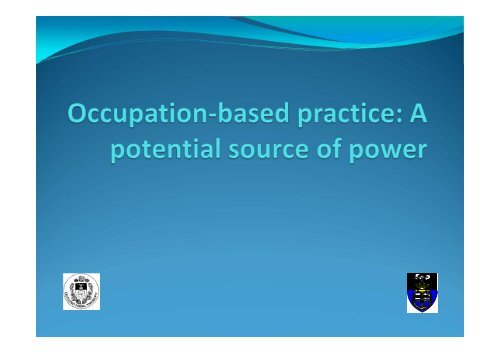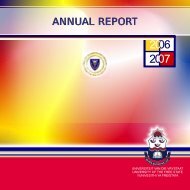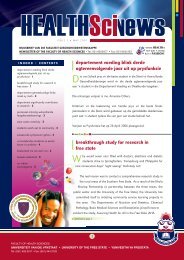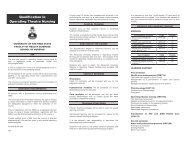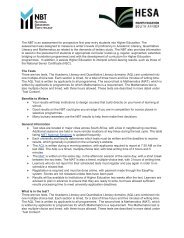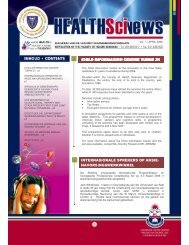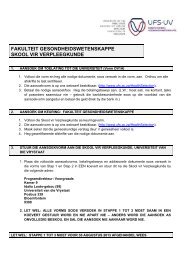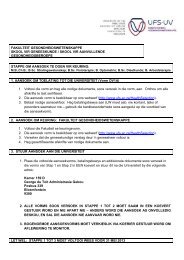Powerpoint - Faculty of Health Sciences
Powerpoint - Faculty of Health Sciences
Powerpoint - Faculty of Health Sciences
You also want an ePaper? Increase the reach of your titles
YUMPU automatically turns print PDFs into web optimized ePapers that Google loves.
What do I mean by occupation‐<br />
based practice?<br />
Occupation as ‘an end’ is the focus on<br />
intervention (rather than<br />
activity/occupation as a means’).<br />
Tromly (1995)<br />
Occupation refers to the ordinary things that people do everyday and the<br />
way they expend their time, energy, interests and skills in meeting their<br />
needs (Townsend & Wilcock, 2004: 244).
Sources <strong>of</strong> Influence...<br />
Teachers and Mentors<br />
Colleagues<br />
UCT OT Team<br />
Students<br />
Literature<br />
Family and friends
Understading occupation...<br />
Dichotomy inherent in occupation‐based practice;<br />
something so unexplainably powerful that is at the<br />
same time so ordinary.<br />
An intervention that will change people themselves,<br />
and their lives on a day by day basis, in big ways and<br />
small ways and will continue to do so – only the<br />
process is mostly unnoticed and unrecognised.
Personal journey...<br />
Starting point:<br />
Activity delineates the domain <strong>of</strong> occupational therapy<br />
practice that makes us unique...<br />
Opportunity to develop thinking:<br />
Occupational therapy as Communication Process<br />
(Fidlers)...<br />
Application in practice:<br />
It worked –and I was able to explain why...<br />
Reading, Teaching, Research
The nature <strong>of</strong> occupational science...<br />
Occupational science as “an academic<br />
discipline, the purpose <strong>of</strong> which is to<br />
generate knowledge about the form,<br />
the function, and the meaning <strong>of</strong><br />
human occupation” (Zemke & Clark<br />
1996:pvii).
The impact <strong>of</strong> Occupational Science on<br />
Occupational Therapy practice...<br />
• It has potential to shape occupational practice directly<br />
and significantly;<br />
– the provision <strong>of</strong> language,<br />
– a focus on occupation,<br />
– an interface <strong>of</strong> varied theoretical perspectives,<br />
– research directions for the pr<strong>of</strong>ession and<br />
– a broad perspective for the development <strong>of</strong> services<br />
across levels <strong>of</strong> care and sectors.
Back to occupation...<br />
Occupational therapists’ concern with<br />
occupational behaviour ‐ concretised as<br />
participation in work, leisure, play and personal<br />
life skills – together with the role it plays in<br />
achievement <strong>of</strong> wellness has been well debated<br />
and documented.<br />
I believe more research should be done to<br />
determine actual impact.
Advantages <strong>of</strong> Occupation‐based<br />
Practice: Contextual Relevance<br />
Relevance accross system levels...
Advantages <strong>of</strong> Occupation‐based<br />
Practice: Occupational Justice<br />
• Occupational justice “is about recognising and<br />
providing for the occupational needs <strong>of</strong> individuals<br />
and communities as part <strong>of</strong> a fair and empowering<br />
society” (Wilcock and Townsend, 2000) (p.84).<br />
• One advantage <strong>of</strong> taking an occupational justice<br />
perspective is that it “provides materiality to relatively<br />
abstract concepts like ‘social justice’” (Swartz, Duncan,<br />
Watson and Clarke, 2004:347).
Advantages <strong>of</strong> Occupation‐based<br />
Practice: Lenses for Occupational<br />
Injustice<br />
When peoples’ occupational engagement is prevented<br />
by a set <strong>of</strong> external limitations on the choices and/or<br />
opportunities, occupational injustice will be the result.<br />
Occupational Deprivation<br />
Occupational Marginalisation<br />
Occupational Imbalance<br />
Occupational Alienation
Participation in the daily life occupations <strong>of</strong> a<br />
community is recognised as an outcome to<br />
advance occupational justice for individuals<br />
and communities and “the practical means<br />
through which humans exert citizen<br />
empowerment, choice and control”<br />
(Wilcock & Townsend, 2004) (p.80).
Advantage <strong>of</strong> Occupation‐based Practice:<br />
Aligned with Policy Imperatives<br />
South African Legislation...<br />
Disability policies...<br />
Initiatives designed to address concerns identified to<br />
be most in need <strong>of</strong> attention and most deserving <strong>of</strong><br />
resources...<br />
Stated priorities...
Advantage <strong>of</strong> Occupation‐based<br />
Practice: Needs Fulfillment<br />
• People in each historical era have implicitly or<br />
explicitly employed occupation as the mechanism<br />
to survive and promote health and well‐being.<br />
Underlying occupational determinants, such as<br />
the type <strong>of</strong> economy, social structure and belief<br />
system shape health (Wilcock 1998, 2001).
Advantage <strong>of</strong> Occupation‐based<br />
Practice: Needs Fulfillment<br />
“Occupations are human pursuits that, at best,<br />
fulfil people’s needs and wants. They have the<br />
transformational power to bring about<br />
development and maturation across multiple<br />
transitions when the choices and processes are<br />
personally meaningful” (Watson & Fourie 2004)
Advantage <strong>of</strong> Occupation‐based<br />
Practice: Culturally Embedded<br />
• Understanding more about what occupies people as<br />
interdependent, active agents in culturally defined<br />
occupations will shed light on “what holds us<br />
together”: an operational definition <strong>of</strong> social cohesion<br />
(Department <strong>of</strong> Arts and Culture, 2004).<br />
• Occupations associated with culture may be readily<br />
incorporated into occupational identity because they<br />
reflect who we are in a cultural context (Unruh, 2004).
Advantage <strong>of</strong> Occupation‐based Practice:<br />
Source <strong>of</strong> self‐efficacy and identity<br />
Self‐efficacy refers to one’s estimation <strong>of</strong> how well one<br />
can execute the actions necessary to deal with life<br />
events. It refers to one’s sense <strong>of</strong> personal competence<br />
(Bandura, 1982 in Hendricks et al, 2002).<br />
Agency means that one is capable <strong>of</strong> exercising control<br />
over events around oneself and that this sense <strong>of</strong><br />
control is vital in the concept <strong>of</strong> wellness (Ramugondo,<br />
2005).
Advantage <strong>of</strong> Occupation‐based<br />
Practice: Relevance<br />
Intervention...<br />
Pr<strong>of</strong>ession...<br />
Relevance will be understood because <strong>of</strong> link with<br />
outcome...
Advantage <strong>of</strong> Occupation‐based<br />
Practice: Occupational Spin‐<strong>of</strong>f<br />
Rebeiro’s ideas and beyond...
How to achieve this?<br />
Name intervention appropriately...<br />
Formulate occupation‐based outcome measures...<br />
Move from stated occupation‐based outcomes to<br />
performance components in setting intervention plans<br />
(even when these might be <strong>of</strong>fered the other way<br />
around).<br />
Always work with occupational beings...<br />
Research
“I was so depressed, I couldn't do anything properly, it<br />
was, .. it was like I'd become a drop out in society, I<br />
disappointed my parents, my family. At school I won 5<br />
prizes in standard 9 and 4 in matric, and when I did go<br />
to [Name <strong>of</strong> University] I got a first in [subject]. So I<br />
had small achievements, but like, I can't study. So I'm<br />
hoping in this job.. ..they will renew my contract so that<br />
I can work for at least 10 years, or so, because (short<br />
pause) you know, I'm not completely stupid even<br />
though I am disabled, I would like a bit <strong>of</strong> status in my<br />
life, and I really would like to get back my self respect.”<br />
[Harold]
Advantage <strong>of</strong> Occupation‐based<br />
Practice: Ongoing impact<br />
Munro proposed the idea <strong>of</strong> identity being punctualized: a<br />
“revealing <strong>of</strong> each specified identity within the here and<br />
now; and in response to the ‘demand’ <strong>of</strong> others”.<br />
So, identities would be ready to reveal when ‘called’ forth<br />
by the demands <strong>of</strong> others in specific situations.<br />
The meaning <strong>of</strong> ‘challenging forth’ (or ordering <strong>of</strong><br />
identities) suggest that orders, for identities to be revealed,<br />
can be more or less prominent for particular reasons.
References<br />
Department <strong>of</strong> Arts and Culture (2004) Report on Social Cohesion and Social<br />
Justice in South Africa.<br />
Hendricks, et al. (2002) Self‐esteem and Self‐efficacy Levels on Adolescents in<br />
an Occupationally Deprived Environment. Honors Thesis in Occupational<br />
therapy. University <strong>of</strong> Cape Town.<br />
Ramugondo, E,L. Unlocking Spirituality: Play as a health‐promoting<br />
occupation in the context <strong>of</strong> HIV/AIDS. In Kronenberg, F, Algado, S.S and<br />
Pollard, N, eds. Occupational Therapy without Borders: Learning from the<br />
spirit <strong>of</strong> survivors. Churchill Livingstone, 2005<br />
Swartz, Duncan, Watson and Clarke(2004) Social Cohesion and Social Justice<br />
in South Africa. Department <strong>of</strong> Arts and Culture<br />
Townsend, E & Wilcock, A (2004) Occupational justice and client‐centred<br />
practice: A dialogue in progress. Canadian Journal <strong>of</strong> Occupational Therapy<br />
71(4)<br />
Townsend E (1999) Enabling occupation in the 21st century: making good<br />
intentions a reality. Australian Occupational Therapy Journal, 46, 147‐159.
References (continued)<br />
Townsend E (2000) Enabling Occupation. Journal <strong>of</strong> Occupational Science, 7<br />
(1): 42‐43<br />
Trombly, C. A. (1995) Occupation: Purposefulness and Meaningfulness as<br />
Therapeutic Mechanisms., American Journal <strong>of</strong> Occupational Therapy, 49, 960‐<br />
72.<br />
Unruh, A.M., "So... what do you do?" Occupation and the construction <strong>of</strong><br />
identity. Canadian Journal <strong>of</strong> Occupational Therapy, 2004. 71(5): p. 290‐295.<br />
Watson, R. and Fourie, M., Occupation and Occupational Therapy, in<br />
Transformation through occupation, R. Watson and L. Swartz, Editors. (2004),<br />
Whurr Publishers: London. p. 19‐32.<br />
Wilcock, A.A. and Townsend, E., Occupational Terminology Interactive<br />
Dialogue. Journal <strong>of</strong> Occupational Science, 2000. 7(2): p. 84‐86.<br />
Zemke R (1996) Preface In Occupational Science: The Evolving Discipline(Eds,<br />
Zemke, R. and Clark, F.) FA Davis, Philadelphia.


